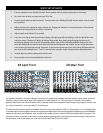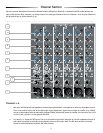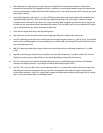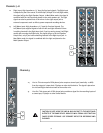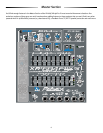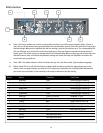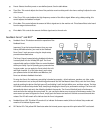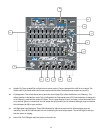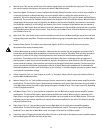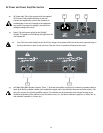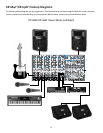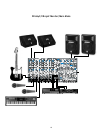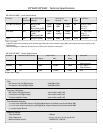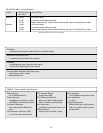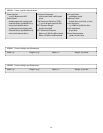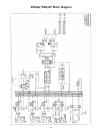
13
31. Monitor Level: This sets the overall level of the monitor signal that is sent to the Monitor output jack. This control
also sets the monitor level going to the power amp when in Main/Mono mode.
32. Power Amp Mode: This button is used to configure the XR 684F/XR 696F as either a stereo or dual mono amplifier. It
is recessed to prevent accidental switching. Use a non-metallic object to change the switch position (e.g.‚ a
toothpick). The unit is shipped from the factory in the default stereo setting (Left to the first power amp and Right to
the second). The two internal Feedback Ferret channels are assigned to the Left and Right outputs. When this switch
is depressed‚ the first power amp is assigned to the Monitors and the second amplifier now becomes a mono Main
(Left and Right combined). In this setting‚ one channel of the Ferret is assigned to the Monitor and one channel is
assigned to the Main signal. Note that when this switch is depressed‚ the Left and Right preamp out jacks as well as
the Right/Main power amp out are now mono. They are also post Feedback Ferret #1 and the Monitor out jack is now
post Feedback Ferret #2.
33. Main Level: This is the master level control for the Main mix sent to the Left/Mono and Right output jacks and their
corresponding power amplifiers. This also controls the Main level going to the power amp when in the Main/Mono
mode.
34. Phantom Power Switch: This switch‚ when depressed‚ applies 48 VDC to all input XLR connectors to power
microphones that require phantom power.
Caution: When phantom power is switched on‚ make sure that any channel you are plugging a microphone into is
turned down and the Master Main and Monitor controls are set to minimum. Otherwise‚ there will be a loud pop in
the system. It is best to first plug in all microphones into their respective channels before phantom power is
switched on. This reduces noise through the system and reduces the chance of damage to the microphones. If
phantom power is used‚ do not connect unbalanced‚ dynamic microphones or other devices to the XLR inputs that
cannot handle this voltage. (Some wireless receivers may be damaged. Consult their manuals.) The line input jacks
are not connected to the phantom supply and are safe for all inputs (balanced or unbalanced). An unbalanced to
balanced impedance converter such as the Peavey 5116 or a Peavey 1:1 Interface Adapter may also be used to isolate
a microphone from phantom voltage.
35. Effects Footswitch: This 1/4" jack accepts an on/off 1/4" footswitch (Peavey Part # 00051000) to defeat effects of
both the Main and Monitor mixes.
36. Monitor Output: This 1/4" jack provides an output from the monitor mix to supply external power amplifier/monitor
combinations. The level of this signal is determined by the Monitor Level control. Note that when the mode switch is
in the Main/Mono mode‚ the monitor signal passes through the Feedback Ferret. This output is post EQ‚ depending
on the EQ assignment switch.
37. Left/Mono Output: This 1/4" jack provides an output from the Left Main mix to supply external amplifier/speaker
combinations. The level of this signal is determined by the Main level control. When no plug is connected to the
Right Output‚ the right signal is mixed with the left and both can be accessed at the Left/Mono Output. This works
well when you use the internal amplifiers for monitor and external amplifiers for the mains. This output is post EQ
and post Feedback Ferret.
38. Right Output: This 1/4" jack provides output from the Right Main mix to supply external amplifier/speaker
combinations. The level of this signal is determined by the Main level control. This output is post EQ and post
Feedback Ferret. Note that in Main/Mono mode‚ this output is the same as Left/Mono output.
39. Power Amp Inputs: Plugging into these jacks allows the user to go directly to the respective power amplifier channel
and therefore bypass the other functions of the mixer.



